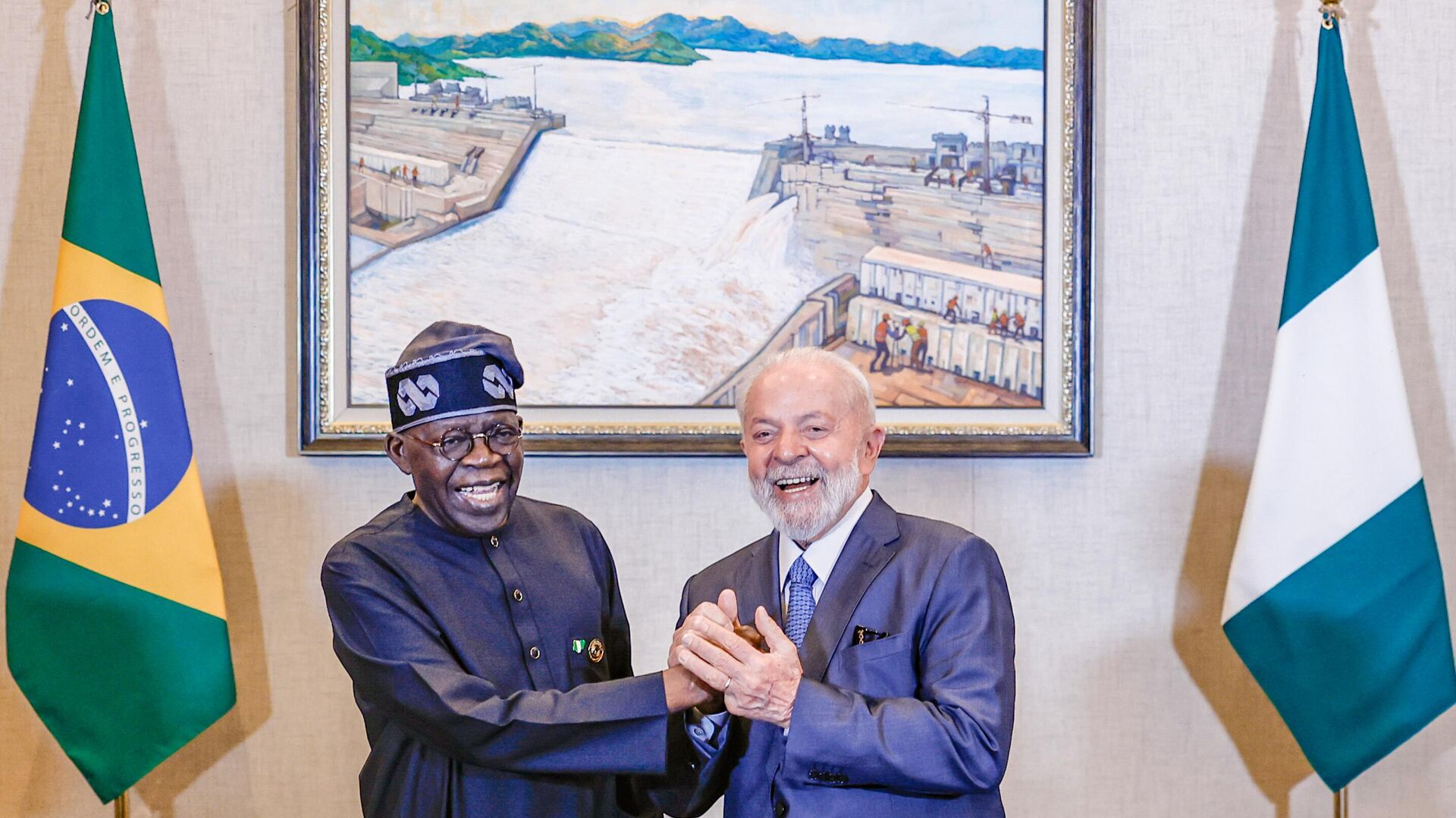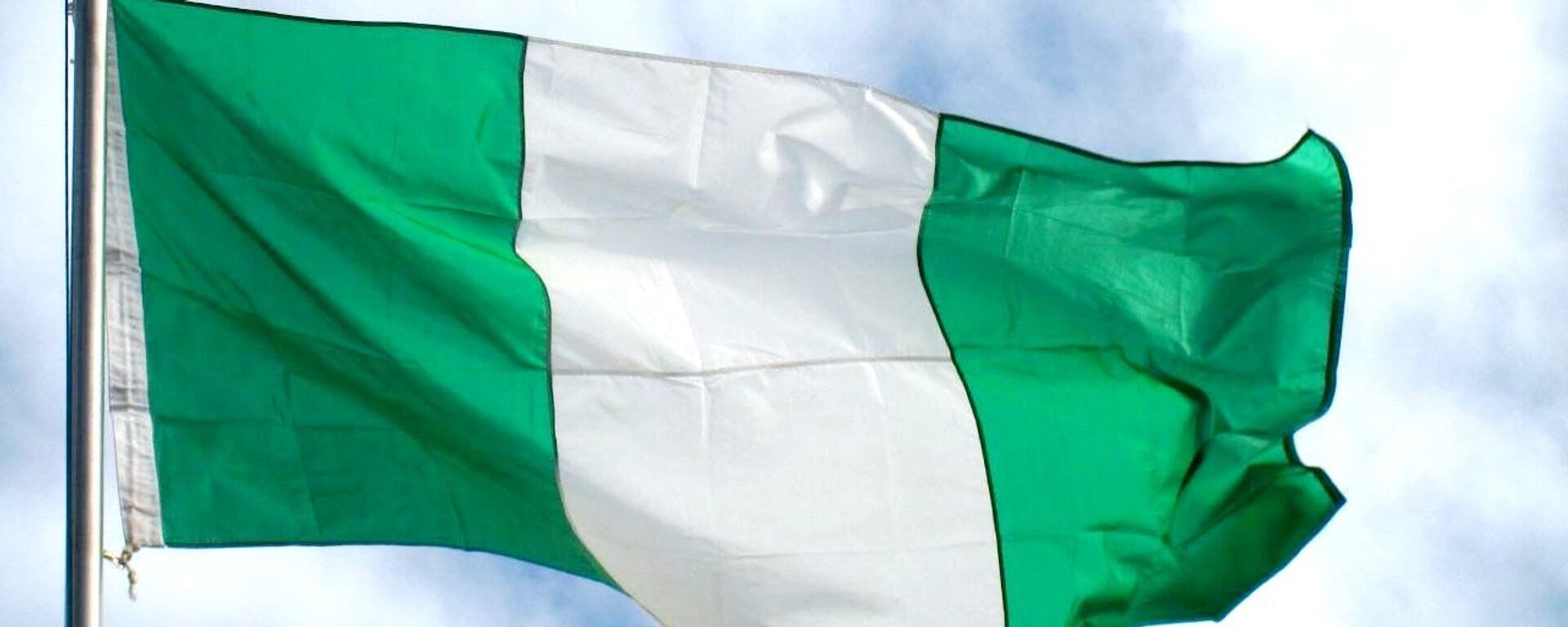https://en.sputniknews.africa/20240415/nigerias-entry-into-brics-would-be-very-important-for-bloc-brazilian-experts-say-1066073994.html
Nigeria's Entry Into BRICS Would Be 'Very Important' for Bloc, Brazilian Experts Say
Nigeria's Entry Into BRICS Would Be 'Very Important' for Bloc, Brazilian Experts Say
Sputnik Africa
In March, during his visit to Russia, Nigerian Foreign Minister Yusuf Tuggar told Sputnik that Nigeria plans to apply for membership in the BRICS bloc of... 15.04.2024, Sputnik Africa
2024-04-15T14:06+0200
2024-04-15T14:06+0200
2024-04-15T14:48+0200
opinion
nigeria
lula da silva
saudi arabia
brazil
brics
economic community of west african states (ecowas)
west africa
africa insight
https://cdn1.img.sputniknews.africa/img/07e8/04/0f/1066074874_0:218:2867:1830_1920x0_80_0_0_0ca7d4dd3293ae56e98716b1536ad2b0.jpg
Nigeria's accession to BRICS would be of "great importance" for the bloc, Eden Pereira Lopes da Silva, a doctoral candidate in comparative history at the Federal University of Rio de Janeiro, told Sputnik.He reasoned that Nigeria has a population with a high growth projection, which means that in terms of economic level, market and also in terms of production, dynamism, it will be "very important" for the BRICS bloc.Another important point, according to Pereira, is Nigeria's "energy power" on the African continent. Today, the country is the largest oil producer in Africa, which is in line with BRICS' interest in attracting countries with strategic resources to the group.Pereira touched on Nigeria's weight in the region, noting that the nation has a great deal of influence in the Economic Community of West African States (ECOWAS) and effectively has veto power over the group's policies.Another pundit, journalist and international relations expert Faustino Henrique, noted that Nigeria manages to combine all these variables, from its "strategic position in the Gulf of Guinea" to being "Africa's largest economy" and "a country rich in minerals, oil, gas and even [...] agriculture."According to him, these elements make Nigeria's presence in BRICS useful, especially because "it is in the interest of the group to expand in order to be able to make bigger political and economic deals on the world stage" and "to become an alternative to the G7."Nigeria, in turn, has a lot to gain from the BRICS, especially in terms of financial assistance, the analyst said.Nigeria has an inflation rate of about 30% per month, which means they have a hunger problem, Pereira pointed out.In this sense, one of the main benefits of joining BRICS for Nigeria is having access to better bilateral exchange agreements in local currencies, a major flagship of the Global South group, Henrique added.Experts, however, cautioned that Nigeria still needs to make clear its interest in joining BRICS. According to them, it is not enough just to want to join, especially now that the New Development Bank (NDB) is expanding its activities.BRICS, currently comprised of Brazil, Russia, India, China, and South Africa, extended invitations during the August summit to Argentina, Egypt, Ethiopia, Iran, the United Arab Emirates, and Saudi Arabia to become full bloc members starting January 1, 2024.During the summit, Brazilian President Lula da Silva said that his country welcomed Nigeria, Angola, Mozambique, and the Democratic Republic of the Congo to join the BRICS alliance.
https://en.sputniknews.africa/20240405/joining-brics-can-help-nigeria-ensure-sustainable-development-in-increasingly-polarized-world-media-1065927315.html
nigeria
saudi arabia
brazil
west africa
Sputnik Africa
feedback@sputniknews.com
+74956456601
MIA „Rossiya Segodnya“
2024
Maxim Grishenkin
https://cdn1.img.sputniknews.africa/img/07e7/0a/17/1063018107_0:0:1104:1103_100x100_80_0_0_03090c85a11f5d2e8a19cf1d989443c9.jpg
Maxim Grishenkin
https://cdn1.img.sputniknews.africa/img/07e7/0a/17/1063018107_0:0:1104:1103_100x100_80_0_0_03090c85a11f5d2e8a19cf1d989443c9.jpg
News
en_EN
Sputnik Africa
feedback@sputniknews.com
+74956456601
MIA „Rossiya Segodnya“
Sputnik Africa
feedback@sputniknews.com
+74956456601
MIA „Rossiya Segodnya“
Maxim Grishenkin
https://cdn1.img.sputniknews.africa/img/07e7/0a/17/1063018107_0:0:1104:1103_100x100_80_0_0_03090c85a11f5d2e8a19cf1d989443c9.jpg
nigeria, lula da silva, saudi arabia, brazil, brics, economic community of west african states (ecowas), west africa, africa insight
nigeria, lula da silva, saudi arabia, brazil, brics, economic community of west african states (ecowas), west africa, africa insight
Nigeria's Entry Into BRICS Would Be 'Very Important' for Bloc, Brazilian Experts Say
14:06 15.04.2024 (Updated: 14:48 15.04.2024) In March, during his visit to Russia, Nigerian Foreign Minister Yusuf Tuggar told Sputnik that Nigeria plans to apply for membership in the BRICS bloc of countries after the necessary preparations are completed in the country.
Nigeria's accession to BRICS would be of "great importance" for the bloc, Eden Pereira Lopes da Silva, a doctoral candidate in comparative history at the Federal University of Rio de Janeiro, told Sputnik.
He reasoned that Nigeria has a population with a high growth projection, which means that in terms of economic level, market and also in terms of production, dynamism, it will be "very important" for the BRICS bloc.
Another important point, according to Pereira, is Nigeria's "energy power" on the African continent. Today, the country is the largest oil producer in Africa, which is in line with
BRICS' interest in attracting countries with strategic resources to the group.
"And also it's a country in a region where the BRICS don't have such a strong presence yet: West Africa," the expert added.
Pereira touched on Nigeria's weight in the region, noting that the nation has a great deal of influence in the Economic Community of West African States (ECOWAS) and effectively has veto power over the group's policies.
"It's not that it has this veto power in the bloc in terms of its institutional position, but it has the veto power because it is the most powerful country in ECOWAS," he said. "So if Nigeria says no to something, these ECOWAS countries will find it difficult to go against Nigeria's opinion."
Another pundit, journalist and international relations expert Faustino Henrique, noted that Nigeria manages to combine all these variables, from its "strategic position in the Gulf of Guinea" to being "Africa's largest economy" and "a country rich in minerals, oil, gas and even [...] agriculture."
"Although South Africa is the most industrialized, Nigeria is the largest economy in Africa with 220 million people," Henrique told Sputnik.
According to him, these elements make
Nigeria's presence in BRICS useful, especially because "it is in the interest of the group to expand in order to be able to make bigger political and economic deals on the world stage" and "to become an alternative to the G7."
Nigeria, in turn, has a lot to gain from the BRICS, especially in terms of financial assistance, the analyst said.
"Most African countries have permanent liquidity problems, which is why they always have to turn to the International Monetary Fund [IMF] to balance their accounts," he explained.
Nigeria has an inflation rate of about 30% per month, which means they have a hunger problem, Pereira pointed out.
"This is because the country is very dependent on the way the current international economy works, especially the one pegged to the dollar," the expert explained.
In this sense, one of the main benefits of
joining BRICS for Nigeria is having access to better bilateral exchange agreements in local currencies, a major flagship of the Global South group, Henrique added.
"Many countries are obviously interested in doing business in an alternative currency to the [US] dollar. India and Saudi Arabia have already expressed this interest," the expert opined.
Experts, however, cautioned that Nigeria still needs to make clear its interest in joining BRICS. According to them, it is not enough just to want to join, especially now that the New Development Bank (NDB) is expanding its activities.
"If at some point Nigeria realizes that it doesn't have much clarity about the function and role of BRICS to solve any of its problems, for example, it may withdraw," Pereira said. "Indonesia, for example, wants to project itself into Southeast Asia. And what does Nigeria want by joining BRICS? I think this is something that the Nigerian government needs to be clear about [...] so as not to create problems in a later process."
BRICS, currently comprised of Brazil, Russia, India, China, and South Africa, extended invitations during the August summit to Argentina, Egypt, Ethiopia, Iran, the United Arab Emirates, and Saudi Arabia to become full bloc members starting January 1, 2024.
During the summit, Brazilian President Lula da Silva said that his country welcomed Nigeria, Angola, Mozambique, and the Democratic Republic of the Congo to join the BRICS alliance.



